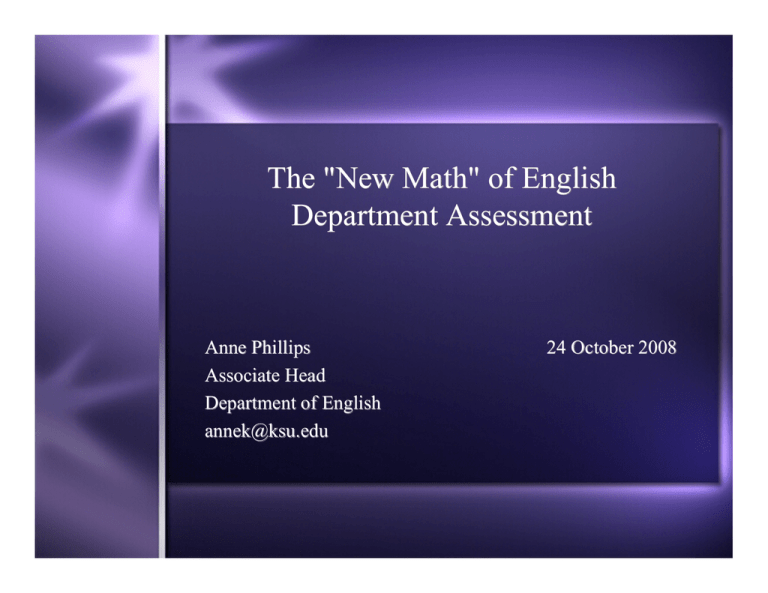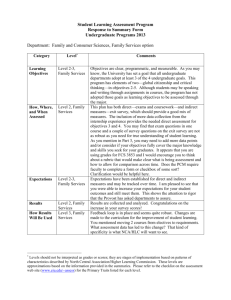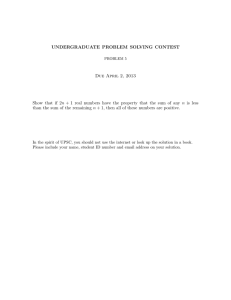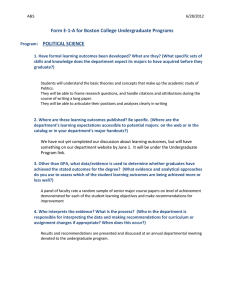The "New Math" of English Department Assessment Anne Phillips 24 October 2008
advertisement

The "New Math" of English Department Assessment Anne Phillips Associate Head Department of English annek@ksu.edu 24 October 2008 55 The number of English faculty participating in a spring 2003 one-afternoon series of workshops about core B.A. degree requirements. 6 The number of undergraduate Curriculum and Assessment Committee members who drafted the Department's Learning Outcomes based on workshop results. 9 The number of undergraduate Student Learning Outcomes the English Department as a whole examined, revised, and approved in September 2003. 23 The number of sections of English 310, the introductory majors' course, in which the first Outcome, on "close reading," was assessed. (20042007) 9 The number of different tenure- track or tenured faculty teaching English 310 in that three-year period. 4 The number of additional undergraduate Outcomes assessed, in addition to close reading, during 2006-2009. 35 The number of different sections of 300-level British and American Literature surveys in which the Department's Learning Outcomes were assessed between 2004 and 2009. 22 The number of different faculty members who have completed Assessment in their individual sections of undergraduate English Department courses since 2004. 12 The number of different undergraduate courses, from English 100 to English 580, that have been included in the Department's formal Assessment program since 2004. 55 The number of English Department faculty who annually have participated in annual conversations about the progress of our undergraduate assessment program. Conclusions Conclusions The Value of Assessment is Tangible. "The assessment worked quite well in generating careful attention to the way language and form function in poetry; . . . . However, I was dismayed with students’ writing skills, and after this assignment I spent a great deal more class time discussing what makes a good thesis, how an introduction functions in literary analysis, and how conclusions function in literary analysis. Later in-class exercises targeting these particular aspects of critical writing can be honed." Conclusions The Value of Assessment is Tangible. The Value of Assessment is Identifiable. “I had put so much emphasis on connotation and tone that I had underemphasized voice, imagery, and pattern. Next time, I want to address those aspects more overtly in class." Conclusions The Value of Assessment is Tangible. The Value of Assessment is Identifiable. Assessment Enhances Student Learning. "Having all 15 of us who teach English 310 discuss the Outcomes we expect from ALL students who take the course was a very good thing. I enjoyed our conversation, both in terms of the sense of general, shared purpose, and the chance to compare among one another concerns or difficulties we've had meeting our goals in the past. Despite the widely different variety of texts we teach, our basic expectations for writing and research skills are indeed a shared commitment." Conclusions The Value of Assessment is Tangible. The Value of Assessment is Identifiable. Assessment Enhances Student Learning. Assessment Benefits Teachers. "Letting students inside the 'machinery' of my course makes them partners in the process. They know why they are being asked to perform in certain ways; when students see the internal logic, the relationships between their coursework and the course’s goals, students are much more willing to complete assignments—they know what they are being asked to do has purpose, has meaning, is not busy work." "Students feel they own more of their education, feel empowered to influence teaching strategies, and they are much more involved in the class because they understand that my efforts are not some arcane mystical happenstance but actually well-planned activities with the students’ own best interests as their main goal." Conclusions The Value of Assessment is Tangible. The Value of Assessment is Identifiable. Assessment Enhances Student Learning. Assessment Benefits Teachers. Assessment provides meaningful results. "Assessment asks both faculty and departments to examine their methods, forces them to consider how what they do actually is in service to the outcomes they have identified. Assessment feedback allows faculty and departments to ascertain which assignments and activities work best to meet their desired outcomes. . . If students are not performing well on specific SLOs, Assessment lets us be creative in trying new assignments and activities which might work better. Without knowing what our goals are and whether we are meeting those goals, there is no feedback loop to let us know that all the efforts and time put into teaching are actually having the effects we desire." Conclusion: Go forth and Assess! With thanks to the following: Dean Hall Elizabeth Dodd Greg Eiselein Department Head Karin Westman The many colleagues who have contributed to the success of English Department assessment during the last five and a half years. And, of course, our students!





